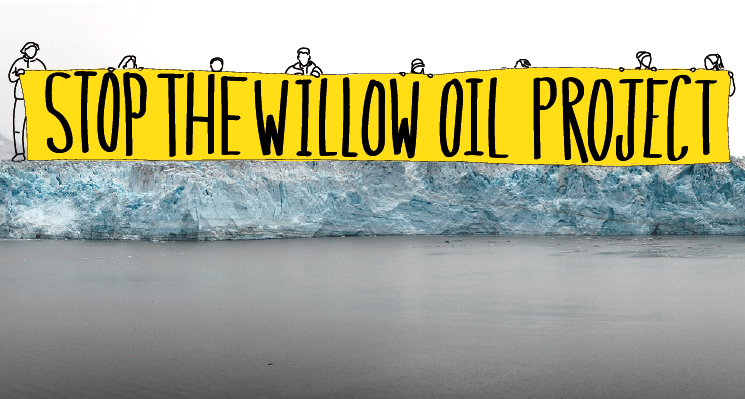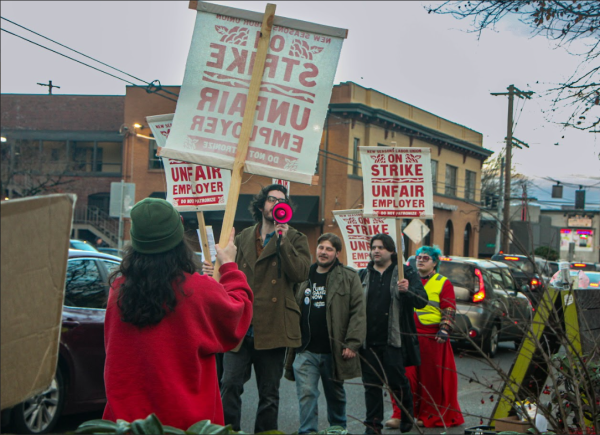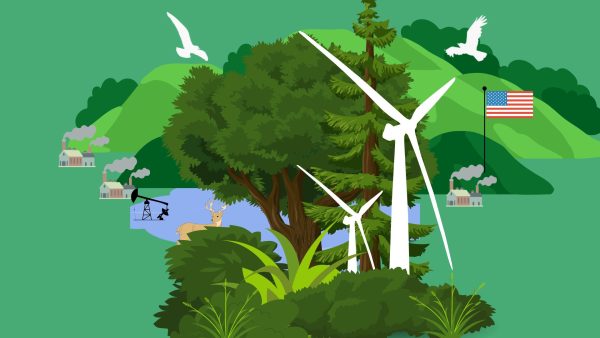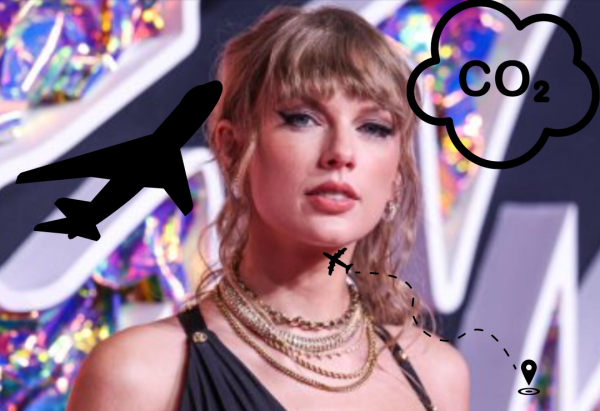Wither the Willow Project
Is it more valuable to aid the economy over the environment?
Protesters have been vocalizing their opinions about the Willow Project.
Providing both economic opportunities and intense environmental impacts, the Willow Project is expected to commence in Alaska. Being the largest proposed oil drilling in the U.S., it is estimated that the Willow Project will produce around a peak of 180,000 barrels of oil per day. Already, this number is alarming and relatively high compared to other oil drilling projects.
President Joe Biden’s administration approved the Willow Project on March 13. Originally, it was proposed during the time of Donald Trump’s administration, but is now getting approval to begin. While this will create the opportunity for new jobs and local investment, the environment is at stake with Willow’s harmful effects.
Federal government officials should approve laws and ideas that help the environment, not hurt it. The money and time spent on fossil fuel infrastructure, like Willow, could be redirected to discovering sustainable renewable energy sources. During Biden’s run for presidency in 2020, the Biden campaign claimed to halt new oil and gas drilling on government lands. However, the opposite decision is being made with Willow.
People support the Willow Project to further pursue economic benefits. ConocoPhillips is the multi-national American petroleum refineries company that will take on the Willow Project. An estimate of $8—17 billion in revenue is expected to be created, which will provide money for Alaska’s federal government and communities. Around 2,000 construction jobs and 300 permanent jobs will become available because of the Willow Project.
This is beneficial for the economy, as the project will boost the revenue of the region. However, is this worth the million metric tons of carbon pollution that will affect the environment?
The Willow Project is located on the National Petroleum Reserve, in the North Slope of Alaska. The arctic is already subject to more vulnerability to climate change due to the region warming four times rapider than other parts of the world.
ConocoPhillips plans to resolve this issue by artificially chilling the tundra to withstand the infrastructure being created for oil and gas. This can cause intense damage on the lands, along with the effects of climate change and the drilling.
According to Stop Willow, the emissions created by the Willow Project will be equivalent to running around 76 coal plants for an entire year. Furthermore, it is predicted that Willow itself would become the largest source of climate pollution. Willow is also expected to, “emit more climate pollution annually than over 99.7% of all single point sources in the country.”
Websites like Stop Willow provide information about ConocoPhillips’ plans and its impact on the arctic. The website also has resources regarding the project, how to help stop it, and gives people an access to help stop it.
Climate change is not something to approach lightly, and every choice impacting it matters. With the effects of climate change being shown as time continues to progress, it’s extremely important for both people in power and media consumers to make the right decision now.
#StopWillow has become trending across multiple social media platforms. The hashtag on TikTok holds over 391 million views, along with Twitter users using #StopWillow to gather the attention of other users to this issue.
By utilizing social media as a platform to spread awareness of climate change and other big environmental changes, it helps spread information to a variety of audiences. Using this attention on social media to bring further awareness to these issues can help create a change in the world.
There are other ways opposing environmental advocates have been using the media to gather attention towards Willow. A petition was created on Change.org, ‘Say No to the Willow Project,’ with over 5 million signatures. By creating a public opinion, supported by a large number of people, Gaining the support of people through petitions can influence decision-makers to create decisions to better suit what a community wants.
Environmental organizations like the Sierra Club, Alaska Wilderness League, and Climate Generation have taken initiative on social media platforms, like Twitter, to engage audiences to the presenting issue.
According to Climate.gov, data has been collected which shows that the, “Earth’s temperature has risen by an average of 0.14° Fahrenheit (0.08° Celsius) per decade since 1880.” Oil drilling projects will further damage the environment and it will cause an irreversible shift in the lives of people all around the globe.
Climate change doesn’t stop for time, and the further action against these environmental issues are pushed back, the more damage is dealt. Share your thoughts and speak up against detrimental projects by using social media, donating to organizations, or signing petitions.
Your donation will support the student journalists of West Linn High School. Your contribution will allow us to continue to produce quality content by purchasing equipment, software, and continuing to host our website on School Newspapers Online (SNO).

Rachel Han, junior, is the Print Editor-in-Chief for wlhsNOW. She has found a passion in writing about opinion pieces and designing graphics. Aside from...





























































![At the bottom of the third inning, the Lions are still scoreless. Rowe stands at home plate, preparing to bat, while Vandenbrink stands off to the side as the next batter up. Despite having the bases loaded, the team was unable to score any runs. “It’s just the beginning of the season. We’re just going to be playing out best by June, [and] that’s where champions are,” Rowe said.](https://wlhsnow.com/wp-content/uploads/2024/03/IMG_3077-1200x900.jpg)







































![All smiles. The group poses for a photo with last year’s book, “This is Our House,” along with their award for third Best in Show. Meikle, who was an Editor-in-Chief for the yearbook last year as well, holds both and stands at the center of the group. “That was an amazing feeling, going and grabbing the third place award,” Meikle said. “All of it paid off. I cried so much over that book, being able to receive [the award] was one of the highlights of my high school career, it was like the coolest thing ever.”](https://wlhsnow.com/wp-content/uploads/2024/11/8bookpose_philly-1200x800.jpg)
























Northern native
Apr 7, 2023 at 11:17 pm
For all you who oppose this project, I suggest that you give up just about everytbing in your daily lives. For instance, your phones, computers, and just everytbing you use in your daily lives as they are by-products of petroleum. We are far far away from weening off of fossil fuels. I suggest you quit playing your video games also as it makes you a hypocrite. I also suggest you go back to walking bearfoot as your soles are made out of petroleum base products. Please educate yourself before you jump on a bandwagon that clueless people lead. even EV cars use petroleum based products such as tires and whatever is plastic inside of it. So all in all, you can go back to living like the old days and tell me how that works out for you. I love in this area and we are bountiful in everything, from caribou, to moose, to seals, whales, and all kinds of waterfowl and game. Please do not speak on my behalf when you haven’t the slightest clue to how things work and how it is living up here mining for the things you want will cause more damage to the environment. Where’s your anger about the donlim gold mine? That will cause more destruction than drilling for oil. Again educate yourself before you jump on a bandwagon with clueless people leading the way. I’m glad they approved of this project because it’ll give access to more hunting and fishing grounds that we did not have access to before. I could careless about the money as it is a tool just as anything else. We may live a modern lifestyle but we have adapted and adapted very well.